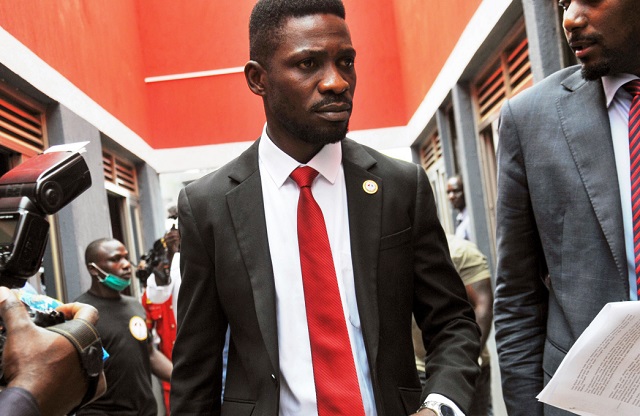
He has already changed the Ugandan opposition. Can he change the government?
| SAM WILKINS AND RICHARD VOKES | Just three weeks into his official campaign for the Ugandan presidency, Ugandan musician and parliamentarian Robert Kyagulanyi (better known by his stage name Bobi Wine) had already been arrested twice. The first came just minutes after his formal nomination in the capital Kampala. Footage streamed by his party showed police smashing the windows of the stationary vehicle Wine and his associates were occupying.
Wine was arrested again while campaigning in Luuka district in mid-November. Protests in a number of Ugandan cities broke out and, in an unprecedented move; most other opposition presidential candidates suspended their campaigns until he was released. At least 49 people were killed in those protests; which already makes this election bloodier than the last one in 2016.
The official reason for both of these arrests was that the police had evidence that Wine was planning illegal rallies with numbers exceeding Covid-19 restrictions.
However, most observers suspect it has more to do with the uncompromising stance he has taken against the incumbent regime of Yoweri Kaguta Museveni. In the blistering speech he gave at his nomination, Wine accused Museveni of crimes ranging from corruption to dictatorship. At one point in the speech, he listed Uganda’s main ethnic groups one-by-one, naming the ways that each have been betrayed by Museveni who has ruled for 34 years.
This is not the first time that Wine has clashed with the police. His 2018 arrest made headlines when he and other politicians were severely beaten in custody and his driver was shot dead by police.
It is also highly unlikely that this latest arrest will be Wine’s last before the January 2021 poll. As has been seen in the past, Uganda’s campaign periods are routinely marred by acts of state intimidation and pressure against opposition candidates and their supporters.
Wine’s confrontational and defiant approach suggests that more pressure from security forces is inevitable. While this much is predictable, the Wine candidacy still raises a number of questions that are difficult to answer.
Leading the opposition
Wine has already achieved something which few observers thought possible: wrestling the platform of primary opposition candidate away from his longtime ally Kizza Besigye.
Besigye’s position as Museveni’s leading antagonist had become as embedded in Ugandan politics as the Museveni presidency itself. After splitting from the regime in 1999, Besigye has been runner-up in four straight elections, winning between 26% and 37% in official tallies.
Every time he has stood, the question of who should lead the scattered opposition has been passionately debated. On each occasion, Besigye refused to give way.
While other prominent opposition candidates have stood, they have not come close to Besigye’s vote share – something which has bolstered the case for his candidacy in each subsequent election.
When it became clear last year that Wine wanted to seek the presidency himself, a clash between the two was imminent. The new parliamentarian had succeeded in captivating the young, educated voters and activists that had powered Besigye’s success. But few observers (ourselves included) believed that Besigye’s de facto opposition leader mantle would be effectively threatened.
Besigye saw it differently, and declared in October 2020 that he would not be running. It is difficult to ascertain the precise reasons for his decision, but the perception that Wine’s political star had eclipsed his own is likely to have contributed in some way.
In numerous by-elections over the past two years, Wine’s endorsed candidates have fared far better than Besigye’s. Opposition activists had placed unprecedented pressure on Besigye’s surrogates to give Wine an open pathway.
 The Independent Uganda: You get the Truth we Pay the Price
The Independent Uganda: You get the Truth we Pay the Price






People should support Bobi wine
If they want to kill Bobi wine let them kill the nation
Free Bobi